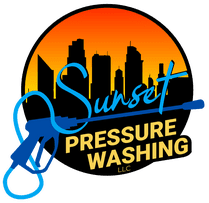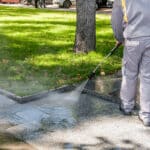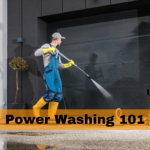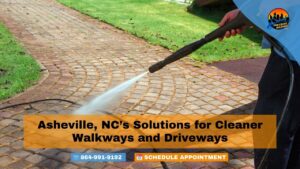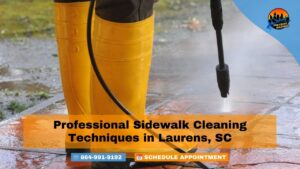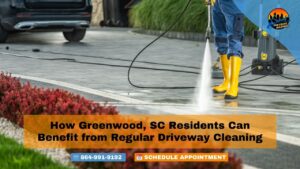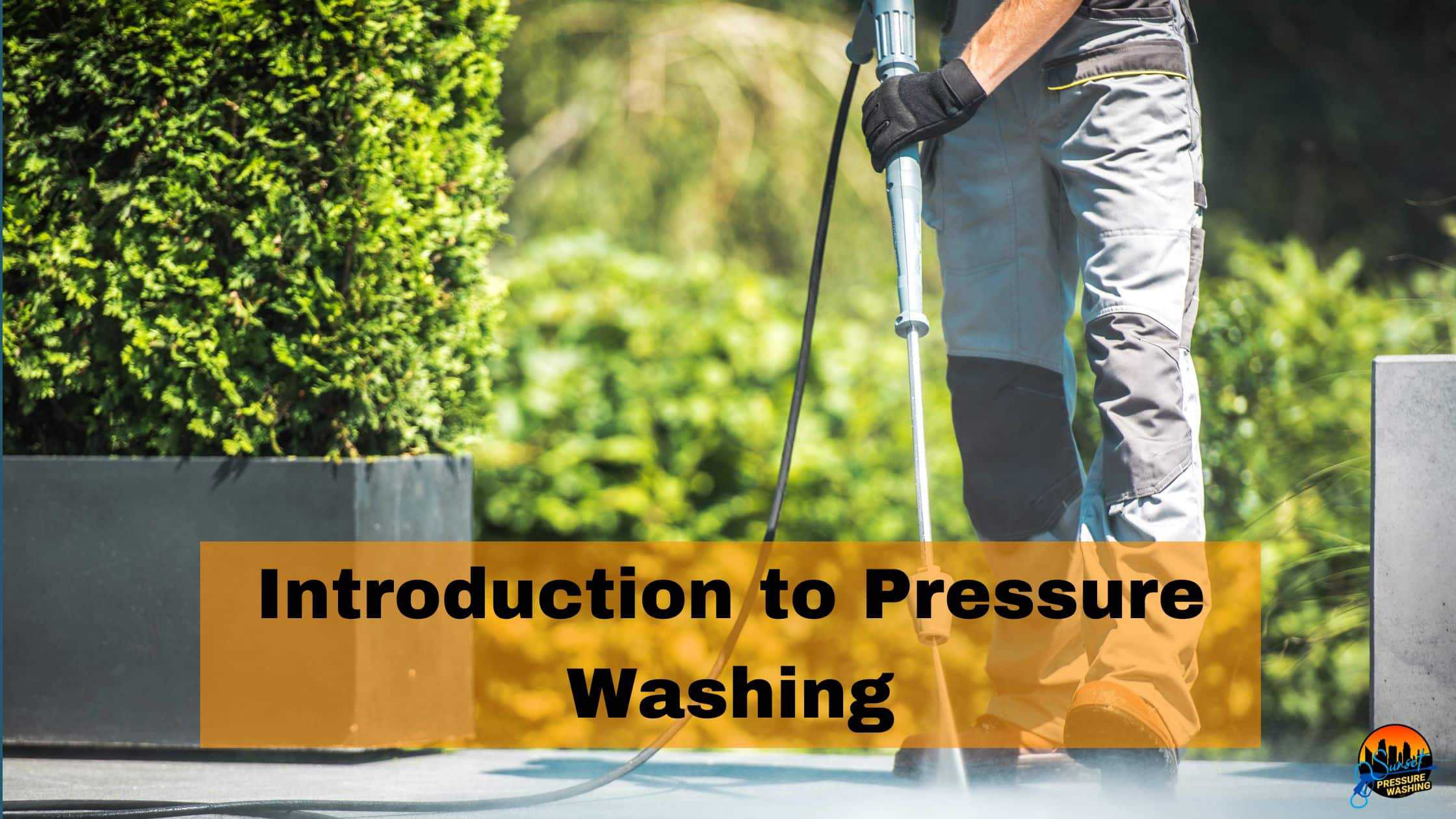
Introduction to Pressure Washing
Pressure washing, also known as power washing, is a dynamic cleaning method that has gained immense popularity for its remarkable ability to rejuvenate surfaces and restore them to their former glory. With the force of pressurized water, pressure washers effectively remove dirt, grime, algae, mold, and various other contaminants from a wide range of surfaces. Whether you’re dealing with a dingy driveway, a weathered deck, or a moss-covered exterior, pressure washing offers a quick and efficient solution to transform your surroundings.
In this comprehensive guide, we’ll delve into the fundamental aspects of pressure washing, from understanding the equipment and techniques involved to exploring its diverse applications. Whether you’re a homeowner looking to enhance your property’s curb appeal or a business owner seeking to maintain a clean and professional image, this guide will equip you with the knowledge needed to harness the power of pressure washing effectively. Let’s embark on this journey and uncover the secrets to achieving cleaner, more vibrant surfaces through the art of pressure washing.
Understanding Pressure Washing
Pressure washing is a highly effective cleaning method that utilizes pressurized water to remove dirt, grime, stains, and contaminants from various surfaces. It’s a versatile technique that can be applied to a wide range of settings, from residential to commercial and industrial environments. To grasp the essence of pressure washing, let’s explore the key components and principles involved:
What is Pressure Washing?
Pressure washing involves the use of a specialized machine known as a pressure washer, which pumps water at high pressure through a nozzle. This high-pressure stream of water is directed onto the surface to be cleaned, effectively dislodging and washing away dirt, stains, and debris. The sheer force of the pressurized water makes it an exceptionally efficient method for cleaning, as it can reach and remove grime from even the toughest-to-reach nooks and crannies.
Different Types of Pressure Washers
Pressure washers come in various types, each suited to specific tasks and requirements. The two main categories are gas-powered and electric pressure washers. Gas-powered pressure washers are more robust and suitable for heavy-duty tasks, making them ideal for commercial and industrial use. Electric pressure washers are more compact and easier to handle, making them a popular choice for homeowners and lighter cleaning duties. Understanding the differences between these types will help you choose the right one for your needs.
Key Components of a Pressure Washer
A typical pressure washer consists of several essential components, including a water inlet, a pump, a motor (either gas or electric), high-pressure hoses, a spray wand, and various nozzle tips. Each component plays a crucial role in the machine’s overall functionality. For instance, nozzle tips determine the spray pattern and pressure intensity, while the pump pressurizes the water. Understanding these components will help you operate the pressure washer effectively and achieve the desired results.
Safety Precautions When Using a Pressure Washer
While pressure washing is an efficient cleaning method, it’s essential to prioritize safety. High-pressure water can be dangerous if not handled correctly. Always wear appropriate safety gear, such as safety goggles and hearing protection, when operating a pressure washer. Additionally, be cautious of the pressure’s force, which can cause injury or damage surfaces if not used correctly. Follow the manufacturer’s instructions and safety guidelines meticulously to ensure a safe and successful pressure washing experience.
Applications of Pressure Washing
Pressure washing is a versatile cleaning method with a wide range of applications across various settings. Its ability to remove stubborn dirt, grime, and contaminants quickly and effectively makes it an invaluable tool for maintaining and rejuvenating surfaces. Let’s explore some of the most common applications of pressure washing:
Residential Use Cases
- Cleaning Driveways and Sidewalks: Pressure washing is ideal for removing oil stains, algae, moss, and dirt buildup from concrete and asphalt surfaces, restoring them to their original condition.
- House Exteriors: It can remove years of accumulated dirt, mildew, and stains from siding, brick, stucco, and other exterior surfaces, enhancing your home’s curb appeal.
- Decks and Patios: Pressure washing can strip away weathered wood fibers, mold, and grime, preparing these surfaces for staining or sealing, extending their lifespan.
- Fences and Outdoor Furniture: It’s an effective way to clean and refresh wooden and vinyl fences, as well as outdoor furniture, making them look new again.
Commercial and Industrial Use Cases
- Graffiti Removal: Pressure washing can quickly eliminate graffiti from walls, signs, and public spaces, restoring the affected areas to their original appearance.
- Parking Lot Cleaning: Parking lots often accumulate oil stains, dirt, and debris. Pressure washing can help maintain a clean and safe parking environment.
- Building Maintenance: Commercial and industrial buildings can benefit from regular pressure washing to remove dirt, pollutants, and mold, preserving the integrity of the structure and its appearance.
Environmental Benefits of Pressure Washing
Pressure washing is not only a practical cleaning solution but also an eco-friendly one. By using high-pressure water to clean surfaces, it reduces the need for harsh chemical cleaners, which can harm the environment. Additionally, pressure washing can help prevent the growth of mold and algae, reducing allergens and improving air quality.
Whether you’re a homeowner looking to enhance your property’s aesthetics or a business owner focused on maintaining a clean and professional image, pressure washing offers a versatile and eco-conscious solution to your cleaning needs.
Choosing the Right Pressure Washer
Selecting the right pressure washer is crucial to ensure that you achieve the desired results for your cleaning projects. There are several factors to consider when choosing a pressure washer, ranging from the type of pressure washer to specific technical specifications. Here’s a breakdown of key considerations:
Gas vs. Electric Pressure Washers
- Gas-Powered Pressure Washers: These machines are generally more powerful and suitable for heavy-duty tasks. They offer greater mobility but require fuel (typically gasoline) and regular maintenance.
- Electric Pressure Washers: Electric models are more compact, lightweight, and easier to handle. They are perfect for residential use and lighter cleaning duties. Electric pressure washers are more environmentally friendly and quieter than their gas-powered counterparts.
Pressure Washer PSI and GPM Explained
- PSI (Pounds per Square Inch): PSI measures the pressure output of the washer. Higher PSI ratings indicate greater cleaning power. Gas-powered units typically have higher PSI, making them suitable for tough cleaning tasks.
- GPM (Gallons per Minute): GPM measures the water flow rate from the pressure washer. A higher GPM can help wash away dirt and debris more effectively. The combination of PSI and GPM determines a pressure washer’s overall cleaning capability.
Nozzles and Attachments
Pressure washers come with a variety of nozzle tips and attachments, each serving different purposes. Common nozzle tips include 0-degree (for pinpoint cleaning), 15-degree (for intense cleaning), 25-degree (general cleaning), and 40-degree (gentle cleaning). Attachments like surface cleaners, extension wands, and detergent applicators can enhance your cleaning efficiency.
Factors to Consider When Buying a Pressure Washer
- Frequency of Use: Consider how often you’ll use the pressure washer. If it’s for occasional home use, an electric model may suffice. For frequent use or heavy-duty tasks, a gas-powered unit may be more suitable.
- Portability: Determine how portable the pressure washer needs to be. If you need to move it around frequently, opt for a lightweight and compact model.
- Storage Space: Consider the available storage space for your pressure washer. Some models are more compact and easier to store than others.
- Budget: Set a budget based on your specific needs and requirements. Keep in mind that higher-quality pressure washers often come with a higher upfront cost but can save you money in the long run through durability and performance.
Choosing the right pressure washer requires a balance between your cleaning needs, budget, and convenience. Understanding these factors will help you make an informed decision and ensure that your pressure washer is the perfect tool for your cleaning tasks.
Pressure Washing Techniques and Tips
Preparing the Area for Pressure Washing
- Clear the Area: Remove any obstacles, furniture, or debris from the area you intend to clean to prevent damage and ensure thorough cleaning.
- Wet the Surface: Before applying high pressure, wet the surface with plain water. This helps loosen dirt and grime and prevents the detergent from drying too quickly.
- Use Detergent Appropriately: Apply a suitable cleaning detergent to the surface, allowing it to sit for a few minutes to break down stubborn stains and grime.
- Follow Manufacturer’s Instructions: Always adhere to the manufacturer’s guidelines regarding detergent use, water temperature, and pressure settings.
Proper Stance and Technique
- Maintain a Safe Distance: Stand at a safe distance from the surface you’re cleaning, especially when using higher pressure settings. Start at least 2-3 feet away and adjust as needed.
- Angle the Spray: Hold the spray wand at a 45-degree angle to the surface, aiming downward. This prevents water from penetrating gaps or lifting siding materials.
- Maintain Consistent Motion: Move the spray wand in a consistent, sweeping motion, overlapping each pass slightly to ensure even cleaning.
- Work from Top to Bottom: Start cleaning from the top and work your way down. This prevents streaks and ensures that the dirty water flows down and away from the cleaned areas.
- Test on a Small Area: Before tackling a large surface, test the pressure washer on a small, inconspicuous area to determine the optimal pressure and distance for effective cleaning without causing damage.
Cleaning Solutions and Detergents
- Choose the Right Detergent: Select a detergent specifically formulated for pressure washers and the type of surface you’re cleaning.
- Use Mildew and Mold Inhibitors: If dealing with mold or mildew, use a detergent containing inhibitors to prevent future growth.
- Rinse Thoroughly: After applying detergent, thoroughly rinse the surface to remove all residues. Failing to do so can leave streaks and a soapy residue.
Avoiding Common Mistakes
- Staying Too Close: Avoid holding the spray wand too close to the surface, as this can damage wood, paint, or delicate materials.
- Using Excessive Pressure: High pressure may be necessary for tough stains, but it can also harm surfaces. Adjust the pressure setting as needed.
- Neglecting Safety Gear: Always wear appropriate safety gear, including safety goggles and hearing protection, to shield yourself from potential hazards.
Safety Guidelines During Operation
- Never Aim at People or Pets: Keep the pressure washer away from people and pets, as the high-pressure stream can cause injury.
- Avoid Electrical Hazards: When using electric pressure washers, ensure proper grounding and avoid using extension cords that are not rated for the machine’s power.
Maintenance and Troubleshooting
Routine Maintenance of a Pressure Washer
- Inspect the Water Inlet Filter: Regularly check and clean or replace the water inlet filter to prevent debris from clogging the system.
- Check and Change Oil (Gas-Powered Models): Gas-powered pressure washers require regular oil changes. Consult your user manual for the recommended oil type and change interval.
- Inspect Hoses and Connections: Check hoses and connections for leaks, wear, or damage. Tighten any loose fittings or replace damaged components.
- Clean the Nozzles and Tips: Remove nozzle tips and clean them of any debris or mineral deposits. Replace worn or damaged tips for consistent pressure.
- Store Properly: When not in use, store your pressure washer in a cool, dry place, and protect it from freezing temperatures if applicable.
Common Issues and How to Fix Them
- Low Pressure or No Pressure:
- Check Water Supply: Ensure a steady water supply and that the hose is free of kinks or blockages.
- Clean Nozzle Tips: Clean or replace clogged nozzle tips.
- Check for Air Leaks: Inspect hoses and connections for air leaks and tighten any loose fittings.
- Purge Air from System: If air is trapped in the system, release it by running the pressure washer with the spray wand open until a steady stream of water emerges.
- Engine or Motor Issues (Gas/Electric Models):
- Check Fuel (Gas-Powered Models): Ensure there is enough fuel and that the fuel valve is open.
- Inspect Spark Plug (Gas-Powered Models): Clean or replace a fouled spark plug.
- Examine Electric Connections (Electric Models): Check power cord and connections for damage or loose wires.
- Pump Problems:
- Replace Seals and O-Rings: Leaking water from the pump may require replacement of seals and o-rings.
- Oil Level (Gas-Powered Models): Maintain the proper oil level in the pump as per manufacturer’s recommendations.
- Water Leaks:
- Check Connections: Tighten hose connections and fittings to prevent water leaks.
- Inspect Hoses: If hoses are damaged, replace them to prevent leaks.
- Excessive Vibrations or Noise:
- Check for Loose Parts: Inspect the pressure washer for loose or damaged components. Tighten or replace as necessary.
DIY vs. Hiring a Professional
When it comes to pressure washing, you have the option to either take the DIY route or hire a professional pressure washing service. The choice depends on various factors, including your expertise, available time, the complexity of the project, and your budget. Let’s explore the advantages and disadvantages of both approaches:
DIY Pressure Washing
Advantages:
- Cost-Effective: DIY pressure washing can save you money on labor costs, especially for smaller projects or routine maintenance.
- Convenience: You have the flexibility to clean at your own pace and on your schedule.
- Control: You can personally oversee the quality of the work and address specific areas of concern.
- Learning Experience: DIY pressure washing can be a valuable learning opportunity, allowing you to gain experience and confidence in using the equipment.
Disadvantages:
- Risk of Damage: Without proper knowledge and experience, you may inadvertently damage surfaces, leading to costly repairs.
- Time-Consuming: Pressure washing can be time-consuming, particularly for larger or more challenging projects.
- Equipment Costs: While DIY may seem cost-effective, purchasing or renting high-quality pressure washing equipment can be a significant upfront expense.
- Safety Concerns: DIY pressure washing can pose safety risks, as high-pressure water can cause injuries if not handled correctly. Safety gear and precautions are essential.
Hiring a Professional Pressure Washing Service
Advantages:
- Expertise: Professional pressure washing services have trained technicians with the expertise to handle various surfaces and stains effectively.
- Time-Efficient: Professionals can complete projects quickly and efficiently, saving you time and hassle.
- Quality Results: You can expect high-quality, streak-free, and uniform cleaning results, enhancing the appearance of your property.
- Proper Equipment: Professionals typically have access to commercial-grade equipment, ensuring optimal cleaning power.
- Safety: Trained technicians prioritize safety and are equipped with the necessary safety gear and experience to prevent accidents.
Disadvantages:
- Cost: Hiring professionals may be more expensive than DIY, especially for larger projects.
- Scheduling: You may need to coordinate with the service provider’s schedule, which may not always align with your availability.
Ultimately, the decision between DIY pressure washing and hiring a professional depends on your specific needs and circumstances. If you have the expertise, time, and necessary equipment, DIY can be a cost-effective option. However, for complex or large-scale projects or when safety and quality are paramount, hiring a professional pressure washing service is often the wisest choice. It ensures that your surfaces are cleaned effectively, efficiently, and without the risk of damage, giving you peace of mind and outstanding results.
Sunset Pressure Washing: A Reliable Pressure Washing Company in NC & SC
When you’re in need of a trusted and experienced cleaning service provider in North and South Carolina, Sunset Pressure Washing is your go-to solution. As a reputable name in the industry, we are committed to delivering top-tier cleaning solutions that revitalize surfaces and extend their lifespan. Here’s why you should choose Sunset Pressure Washing:
Introduction to Sunset Pressure Washing
Sunset Pressure Washing proudly serves the vibrant communities of North and South Carolina. With a proven track record of excellence, our skilled technicians possess the expertise required to handle a wide range of cleaning projects, consistently delivering outstanding results.
Why Choose Sunset Pressure Washing?
- Professional Expertise: Our team comprises highly trained and experienced technicians who understand the intricacies of cleaning, ensuring each project is executed to perfection.
- Advanced Equipment: Sunset Pressure Washing uses cutting-edge, commercial-grade equipment, guaranteeing powerful and consistent cleaning outcomes.
- Environmental Responsibility: We prioritize eco-friendly practices, using safe detergents and responsible water usage to minimize our environmental impact.
- Comprehensive Services: Sunset Pressure Washing offers a comprehensive suite of cleaning services to meet your unique needs.
Services Offered by Sunset Pressure Washing
Our extensive range of services includes:
- Pressure Washing Services: Efficiently removes dirt, grime, and stains from various surfaces.
- Power Washing Services: A powerful option for tackling tougher cleaning challenges.
- Soft Wash: A gentle approach for delicate surfaces, ensuring thorough cleaning without damage.
- Window Cleaning Services: Delivers streak-free results, enhancing the clarity and appearance of your windows.
- Gutter Cleaning Services: Ensures your gutters are free from debris, preventing clogs and potential damage.
- Sidewalk Cleaning Services: Revives sidewalks to their pristine condition.
- Residential Pressure Washing Services: Customized solutions for homeowners.
- Commercial Pressure Washing Services: Tailored services to meet the needs of businesses.
- House Washing Services: Restores the exterior of your home.
- Roof Cleaning Services: Removes moss, algae, and stains to extend the life of your roof.
- Stair Cleaning Services: Ensures safety and aesthetics in high-traffic areas.
- Concrete Cleaning Services: Refreshes concrete surfaces.
- Driveway Cleaning Services: Eliminates oil stains and dirt buildup.
- Walkway Cleaning Services: Enhances the appearance of walkways.
- Curb Appeal Pressure Washing Services: Boosts the visual appeal of your property.
- Oil & Grease Stain Removal Services: Eliminates tough oil and grease stains.
- Mold and Mildew Removal Services: Addresses mold and mildew growth.
- Red Clay Removal Services: Removes stubborn red clay stains.
- Rust Removal Services: Eliminates unsightly rust stains.
- Gum Removal Services: Safely removes gum from surfaces.
- Healthcare Cleaning Services: Specialized cleaning for healthcare facilities.
- Bank Cleaning Services: Tailored cleaning solutions for financial institutions.
- Corporate Cleaning Services: Comprehensive cleaning services for corporate clients.
- Car Wash Cleaning Services: Ensures cleanliness and appeal in car wash facilities.
- School Cleaning Services: Maintains a clean and safe environment in educational institutions.
- Retail Cleaning Services: Enhances the shopping experience in retail spaces.
- Parking Deck Cleaning Services: Restores parking decks to their best condition.
- Parking Lot Cleaning Services: Keeps parking lots clean and inviting.
- Apartment Cleaning Services: Customized solutions for apartment complexes.
- Gas Station Pressure Washing Services: Ensures cleanliness and safety at gas stations.
Customer Testimonials and Success Stories
Our commitment to customer satisfaction is reflected in the testimonials and success stories of our delighted customers. We take pride in consistently delivering quality service that exceeds expectations.
Contact Information and Booking Details
Ready to transform your surfaces with Sunset Pressure Washing? Contact us today to schedule your cleaning project. You can reach us through our email at info@sunsetpressurewash.com or by phone at 864-991-9192. Our friendly team is here to assist you with inquiries, quotes, and scheduling.
Place your trust in Sunset Pressure Washing to breathe new life into your surfaces with our exceptional cleaning services. Discover the difference that professional expertise can make, and let us elevate the cleanliness and aesthetics of your property. Visit us or give us a call today, and experience the power of Sunset Pressure Washing for yourself in North and South Carolina!
